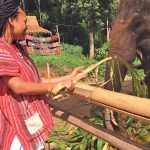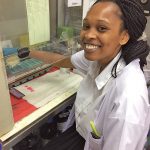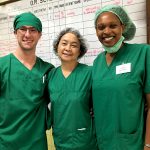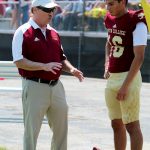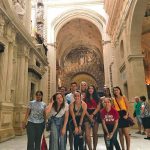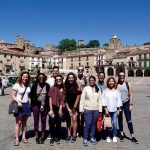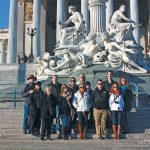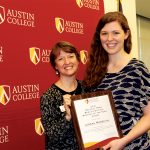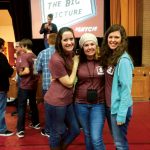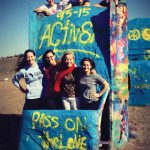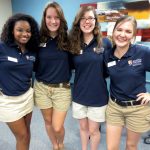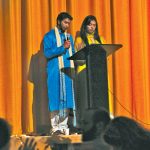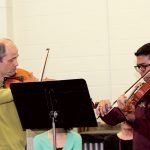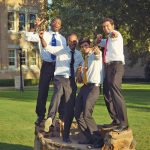![]()
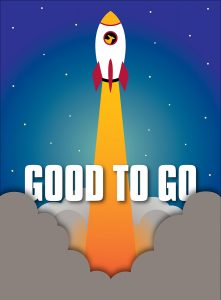 The Austin College experience has been successfully launching graduates into careers and postgraduate and professional studies for decades.
The Austin College experience has been successfully launching graduates into careers and postgraduate and professional studies for decades.
For most students in recent years, that experience has included an internship or research project, international study or creative project, servant leadership or other activities that put their classroom education into action. In fact, a faculty committee discovered that nearly 90% of recent graduates had one or more such experience—but that wasn’t enough. What about the remaining students?
The newly designed and approved Compass Curriculum, effective Fall Term 2019, answers that question and ensures that every student will enjoy practical experience and the deeper learning that accompanies it.
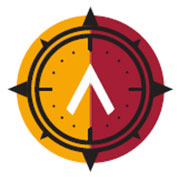
“Applied learning experiences have value far beyond building the kind of social skills, work ethic, and practical expertise that are important for life in the world,” said Dr. Beth Gill, Vice President for Academic Affairs and Dean of the Faculty. “In keeping with the intellectual goals commonly associated with an education of breadth and depth, these experiences also improve the quality of learning itself by giving students a deeper understanding of the subject and enhancing their capacity for critical thinking, while developing the skills for lifelong learning.”
Extreme encounters with learning outside the classroom generally have one of three outcomes: 1) confirm a career path for a student; 2) expose that an area of interest or direction is not as appealing as originally thought; or 3) reveal a student’s passion for something completely new—producing an exciting course correction.
“A significant development in the Compass Curriculum is that all students will participate in an applied learning experience as part of their college journey,” said Dr. Karla McCain, The Rupert B. Lowe Chair in Chemistry and Associate Dean of Institutional Effectiveness. “Applied learning is not only for the extroverted go-getter or the one who already has a life plan. Every student will experience at least one of these opportunities.”
Many applied learning programs and activities don’t require extensive applications, exclusive selection processes, or additional costs for students. Faculty also are intentionally seeking ways to build applied learning into more courses, and the Applied Learning Committee will examine new and existing campus activities that might meet the applied learning requirement.
Now, all students will dig deeper at least once—but possibly many times—into learning experiences that build skills, confidence, and résumés.
| The following profiles illustrate the positive effects and outcomes of applied learning. For these young alumni and so many others, an Austin College education is like the careful preparation before a countdown to launch. 3 … 2 … 1. Good to go. |
![]()
Right on Course
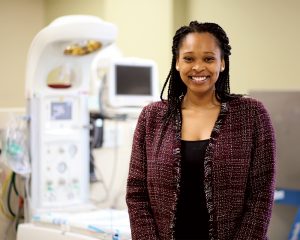
ALISA WHITE ’20 has curated the kind of college experiences that build stamina, make connections, and lead to a career. After graduating in 2020 with a major in Biochemistry and minors in Spanish and Leadership Studies, she will enter Texas Tech Medical School, admitted through the Early Acceptance Program as a junior. She’s had that goal in mind from day one and worked toward it in expected and unexpected ways.
“In my time at Austin College, I have had many applied learning opportunities, including off-campus research, a Global Outreach Fellowship in Thailand, a medical shadowing JanTerm, CityLab JanTerm classes, and a SEPA grant writing internship serving MasterKey Ministries,” she said.
Through these opportunities, Alisa says she has learned to work effectively on team-based projects, feel a part of the global community, and appreciate the value of servant leadership.
During her 2019 JanTerm course, “CityLab: Food as Medicine,” Alisa visited UT Southwestern School of Medicine and Moncrief Cancer Institute of Fort Worth where she met Dr. Matthew Carlson, gynecological cancer specialist. Based on their connection during the one-month course, Carlson invited Alisa to shadow him during summer 2019. She gained experience with patient consultation, created patient handouts about healthy lifestyle practices, and learned more about the role of culinary medicine in the treatment of cancer. Alisa is interested in women’s health and gynecological and obstetric medicine.
“My work with the JanTerm culinary medicine course and Dr. Carlson in combination with my grant writing work for MasterKey Ministries food pantry further strengthened my interest in medicine and gave me firsthand experiences in holistic health—making me a more qualified applicant for the Texas Tech Early Acceptance Program,” she said. “Each one of my Austin College experiences has shaped me and empowered me to use hard work, integrity, service to others, and passion to make the world a better place.”
Traveling the world as a volunteer or leading service on campus as a member of the College’s Service Station Board, Alisa believes a positive attitude will inspire others to serve. During her internship as a grant writer, her supervisor said they were so impressed with her they already referred to her as Dr. White. During her summer shadowing experience, she was able to consult with patients about their diets, just like medical students in culinary medicine. Alisa is gathering all her experiences to put to use when she becomes a medical professional—right on course.

![]()
This is Not a Drill
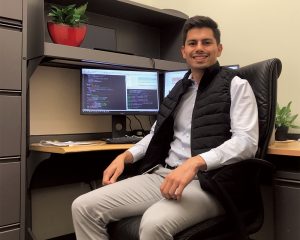
In Washington D.C., CESAR RUIZ ’18 works on predictive modeling and supply chain research of the pharmaceutical industry. As a member of the economics staff of the U.S. Food and Drug Administration, he studies the numbers; as a graduate of Austin College, he appreciates the people those numbers represent.
While at Austin College, Cesar majored in International Relations and Economics and then continued at Carnegie Mellon University to study Public Policy with an emphasis on Data Analytics. “It’s definitely not a very common combination, but it lets me intersect my interest in data science with the ability to work on issues of public interest,” he said.
Cesar learned many skills while participating as a student and head delegate for Model United Nations at Austin College. “Model United Nations gave me great experience with professional writing and project management,” he said. “Given the relevance of memo and report writing in the world of public policy, coming into interviews with demonstrable experience was extremely helpful.”
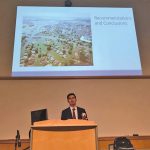 However, it was in Dr. Kevin Simmons’ JanTerm class, “The Economics of Poverty” that Cesar began to understand the people behind the economic issues—people in need of solutions. During the course, students spent class time learning about poverty; then they “lived” it. Becoming their own case studies, students developed mock household budgets and then were dealt various life situations, such as loss of job, divorce, or devastating illness to deal with. In other words, life happened.
However, it was in Dr. Kevin Simmons’ JanTerm class, “The Economics of Poverty” that Cesar began to understand the people behind the economic issues—people in need of solutions. During the course, students spent class time learning about poverty; then they “lived” it. Becoming their own case studies, students developed mock household budgets and then were dealt various life situations, such as loss of job, divorce, or devastating illness to deal with. In other words, life happened.
 For Cesar, the class and the exercise helped shape his plans for the future. “Having to set up such a detailed budget and research realistic ways to stretch that when faced with everyday issues forced us all to look at the situation from a new perspective, and to realize that lives we may take for granted shield us from so much unpredictability,” he said.
For Cesar, the class and the exercise helped shape his plans for the future. “Having to set up such a detailed budget and research realistic ways to stretch that when faced with everyday issues forced us all to look at the situation from a new perspective, and to realize that lives we may take for granted shield us from so much unpredictability,” he said.
“At the end of the JanTerm, Dr. Simmons talked about the importance of not just rationalizing away people’s problems but trying to live in their shoes before forming an opinion,” Cesar said. “That outlook has stuck with me as I look to enter a field where communities are often at risk of being reduced to numbers on a screen.”
Cesar combined many interests into his Austin College learning experience. As a placekicker for ’Roos football, Cesar was named CoSIDA Academic All-District and the Bo Miller Scholar Athlete. He presented his business honors thesis on flood insurance participation in coastal counties to National Oceanic and Atmospheric Administration scientists and University of Oklahoma professors. As his thesis advisor said, “When professors ask for a copy of the paper and access to your data, you know you did well.” Cesar studied in Spain for a month and competed in Model United Nations in New York City. All was preparation for his future.

![]()
A New Trajectory
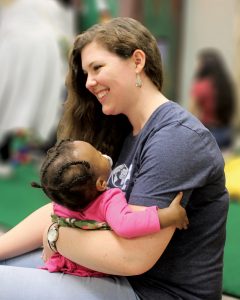
At her office at Buckner Children and Family Services, JORDAN CASTLE ’15 lives and works for families in her job as Ministry Engagement Coordinator for North Texas. Her office supports programs including foster care and adoption, kinship care, and programs for young women who have aged out of foster care, as well as single mothers and their children.
At Austin College, Jordan majored in Religious Studies and Psychology with plans for a career in research. She was interested in data about how people live, work, and behave. To put that into practice, she completed and presented an undergraduate psychology research project. Among other involvements, she also was a Sallie Majors Religious Life Intern her senior year, working with Chaplain Dr. John Williams ’84 and the ACtivator ministry.
On a short trip to Camp Gilmont with the other Sallie Majors Interns, Jordan met Presbyterian minister Polly Williams, who introduced her to The Stewpot, a ministry of First Presbyterian Church of Dallas that provides meals and case work assistance to families experiencing homelessness. Polly told her about internship opportunities, and Jordan’s plans began to change.
She secured an internship with The Stewpot that developed into three summers as a visiting youth director, then three years of full-time employment as a volunteer coordinator. “I totally credit that connection to Polly, and the opportunity through Austin College that gave me a way into the world of nonprofits in Dallas,” Jordan said.
“My experience at Austin College completely changed the path of my career and what I was and am passionate about,” she said. “I had no idea that I had a passion for volunteerism until I served as an intern and volunteered in various roles around Sherman, which changed my career trajectory. I had hoped to work in psychology research until I learned that I love working with volunteers—and ended up in a job working with 45 volunteers a day.”
“Austin College definitely built my confidence and helped me understand myself more completely,” Jordan said. She plans to become a Licensed Marriage and Family Therapist as a continuation of her desire to serve people. “I developed that at Austin College,” she said, “and I don’t think I’d be headed down this career path if not for my education there.”
Jordan’s college life was full! She was a resident assistant, Admission tour guide, and president of InterVarsity Christian Fellowship. She enjoyed the ACtivator youth ministry and leading the annual Presbyterian Senior High Youth Connection (SHYC). She and classmates traveled to Turkey and Austria to study Ottoman and Hapsburg history for a JanTerm. Jordan’s generous spirit and volunteerism on and off campus were recognized with the Oscar C. Page Servant of the Year Award. She also found her husband-to-be, confidence in public speaking, and a new career direction. She’s not finished yet; she’s considering graduate studies in the future.

![]()
Engage the Boosters
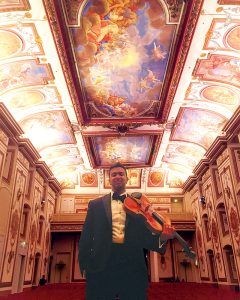
RIZWAN JAGANI ’15 arrived at Austin College as a Pre-Med student. That was followed by a short stint with a Pre-Engineering focus. Then, with the help of Dr. Ricky Duhaime of the Austin College Music Department faculty, Rizwan’s mission became clear—acknowledge his gift of music, follow his heart, and major in Music.
“Austin College made me realize what I was truly meant to do and gave me the space to discover that,” Rizwan said. “I always knew in the back of my head the importance of music in my life, but it did not manifest itself as an option for my future until I had mentors who helped nurture it.”
Rizwan began playing viola at age 10 and continued throughout high school with private lessons, solo competitions, and UIL all-region orchestra placement. At Austin College, he performed for four years in both the Sherman Symphony Orchestra and the Austin College Chamber Orchestra.
Duhaime, Chamber Orchestra director and Mildred S. Mosher Professor in Music, welcomed István Polónyi of the Szent István School of Music in Budapest to Austin College through the Mary Wright Visiting Artist Program in spring 2014. During his week on campus, the renowned Hungarian violist worked with students and master classes—and he met Rizwan Jagani.
“I knew this could be important for Rizwan,” Duhaime said. He noted that a great advantage of studying at a small, liberal arts school is that students can be known for their talents and connected to mentors who can make a difference.
“István actually motivated me to pursue music professionally as he saw tremendous potential in me,” Rizwan said. Their friendship has continued as Rizwan has performed with his mentor at the Classical Music Festival in Eisenstadt, Austria, for four years; in August 2019 as associate principal violist, Rizwan was sitting next to Polónyi during performances.
After graduating from Austin College, Rizwan completed his master’s degree in Music at Carnegie Mellon University in May 2019. In August, he released a CD and digital download titled Endless Night, and he is working toward an Artist Diploma at the University of Nevada, Las Vegas. As a tech-savvy music professional, Rizwan is exploring performance options and riding his dreams as far as they will go.
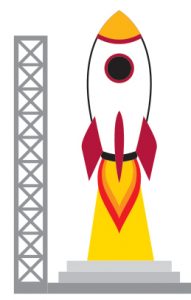 Rizwan’s talents in music were always close to his heart, regardless of his area of study. As part of his decision to minor in Spanish, he says he had two incredible international study experiences—one in Chile and one in Mexico. In Mexico, he discovered a violin-making school and was able to borrow a locally made viola for a week—a real highlight! He took part in Austin College’s KangaRAAS competitive Indian Garba/Raas dance team and was active in organizations that shared his cultural heritage. He credits Austin College with providing opportunities “to become who I am as a person and an artist.”
Rizwan’s talents in music were always close to his heart, regardless of his area of study. As part of his decision to minor in Spanish, he says he had two incredible international study experiences—one in Chile and one in Mexico. In Mexico, he discovered a violin-making school and was able to borrow a locally made viola for a week—a real highlight! He took part in Austin College’s KangaRAAS competitive Indian Garba/Raas dance team and was active in organizations that shared his cultural heritage. He credits Austin College with providing opportunities “to become who I am as a person and an artist.”

![]()
The Class of 2023 is the first to be guided by The Austin College Compass Curriculum. Combining tenets of the time-tested liberal arts education—like critical thinking and diversity awareness—with hands-on experiences and exploration from multiple perspectives, the curriculum delivers a powerful education for the 21st Century. Five Compass Curriculum elements guide students on their journey.
Through Experience, ’Roos connect their liberal arts education with learning beyond the classroom, as illustrated in the previous pages of “Good to Go.” Compass includes at least one Applied Learning Experience, three January term courses, and the New Student Seminar, formerly Communication/Inquiry (C/I).
To further prepare for life in a global society, students Engage through one course in Global Diversity and one course in Systems of Power, Privilege, & Inequality. All students work toward competence in a language in addition to English.
Students Discover a range of disciplines and make important connections through the diverse requirements of the Compass Curriculum. All students take four courses in Humanities, two courses in Social Sciences, and two courses, one with a lab, in Sciences.
Compass directs students to Develop key abilities crucial to their future success. All students take one course in Foundational Writing and two courses in Advanced Writing. Students also take Quantitative Literacy to understand research methods used to gather and manipulate data.
Students Focus their efforts by choosing a major and minor from the College’s 55 areas of study. All students must complete a major and minor, or two majors, for graduation.
Within this framework, students complete the requirements of the Compass Curriculum and leave Austin College “good to go” in their next steps toward rewarding careers and full, engaged, and meaningful lives.
A CHANGING WORLD: NEW MASTER’S PROGRAM ON CAMPUS
Austin College and Texas Tech University signed a new partnership in fall 2019 that will allow Austin College students to “fast track” a master’s degree in Mass Communications from Texas Tech, with Texas Tech faculty conducting the graduate courses on Austin College’s campus. Watch for details on the website.

